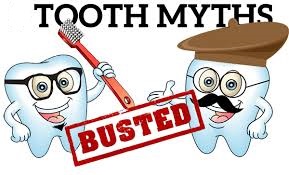
Dental myths have existed for years, passed down for generations. Much of it is false or misleading. Set the record straight with the facts as follows-
Myth-1: Only Sugar causes cavities.
Sugar itself doesn’t cause cavities, although it can contribute to it. it’s the bacteria that eat the sugar. These bacteria produce an acid compound that promotes tooth decay.
Myth-2: You will clean your teeth more thoroughly if you brush harder.
Brushing harder is counterproductive. The harder you brush, the more trauma the tooth enamel and gum tissue endure. Instead of keeping your teeth cleaner, this will actually harm them.
Myth-3: Flossing is not really necessary.
Flossing is an integral part of maintaining good oral health. Flossing removes up to 80% of plaque. Plaque deposits promote tooth decay, but you can remove them with a daily flossing regimen.
Myth-4: You don’t need a dentist if you aren’t experiencing a toothache.
An exam is the best way to spot trouble before it starts. The longer problems go undetected or untreated, the harder they are to treat when you do start to notice them. When it comes to oral health, people who don’t visit the dentist regularly end up paying the price.
Myth-5: Chewing Gum works like brushing.
Chewing gum is not a replacement for brushing your teeth. Chewing gum cannot replace brushing your teeth. While chewing gums can promote better breath and cleaner teeth, it cannot replace regular brushing and flossing your teeth.
Myth-6: White teeth are healthy teeth.
It is a common misconception that teeth that are pearly white are healthy. People don’t have the same natural color for their teeth, so having white teeth isn’t the standard for good oral health.
Whiter teeth are not always healthier teeth. Teeth begin white, and over time, they can become discolored through staining or damage.
Myth-7: Charcoal toothpaste is better.
Charcoal toothpaste is marketed for whitening but in reality, it offers little protection for teeth. Charcoal toothpaste actually works against teeth by absorbing protective agents meant to keep teeth healthy and strong.
Myth-8: It’s only a baby tooth.
Baby teeth are very important. They provide the necessary space for permanent teeth to line up underneath the gums and grow in properly. It is important to make sure that your child’s teeth are as healthy as possible.
If a child isn’t brushing and flossing their baby teeth, odds are they won’t brush and floss their permanent teeth either, which leads to more severe and expensive dental issues as they get older. So all in all, it is more than just a baby tooth.
Myth-9: Flossing creates a space between your teeth.
Flossing prevents tooth decay between your teeth, it does not create spaces between them. When flossing, you remove food debris around your gums and teeth, and by removing the harmful bacteria you keep your mouth healthy.
Myth-10: Diet sodas are okay to drink because they don’t have sugar in them.
Though diet sodas don’t have cavity-causing sugars in them, they still are highly acidic. Our mouth has acid-loving bacteria that contribute to cavities. The acid in diet soda eats away at enamel (the outer protective layer of our tooth surface) causing tooth sensitivity.
Besides soda, other acidic beverages like orange juices, citrus juices, etc. can also cause similar damage. The healthiest alternatives to keep your body hydrated are water, vegetable juice, and milk.
Myth 11: Kids don’t need to brush baby teeth.
Poor oral health early on can lead to lifelong complications. Kids should start brushing twice per day as soon as they have teeth. Tooth decay in children can lead to health concerns long after their baby teeth are gone.
Myth 12: My teeth are unhealthy because I’m aging.
Aging is not an automatic factor in deteriorating oral health. Those who take care of their teeth during their childhood and adult years will still have healthy teeth in their senior years.
In general, oral hygiene is important no matter your age, so be sure to brush and floss throughout your entire life to keep your mouth healthy.
Myth-13: Oral health is not connected to the rest of the body.
Your oral health is connected to your systemic (overall) health and there are many correlations between your mouth and body. A mouth with severe tooth decay and periodontal disease is more likely to cause bacteria to enter the bloodstream and result in other health issues.
Myth-14: If you have no oral health concerns, there is no need to visit the dentist.
An exam is the best way to spot trouble before it starts. The longer problems go undetected or untreated, the harder they are to treat when you do start to notice them.
Semi-annual dental exams for adults and kids are the best way to maintain optimal oral health — so even if you don’t notice anything amiss, it’s best to still schedule routine dental checkups.
Myth 15: It doesn’t matter what time of day I brush.
While we recommend each of our patients brush their teeth at least twice a day, brushing at a certain time does have an impact on your oral health. At night when we sleep, our salivary glands produce less saliva. During the day our saliva flow is higher and it provides a cleansing effect that we don’t get at night.
So, when we don’t brush our teeth at night before bed, those food particles sit on our teeth all night and contribute to tooth decay over time. Brushing in the morning not only fights decay but also helps fight bad breath.
Furthermore, choice of diet plays an integral role in oral health. It is recommended to brush right after consuming food and drink high in sugar and carbohydrates to prevent cavities.
